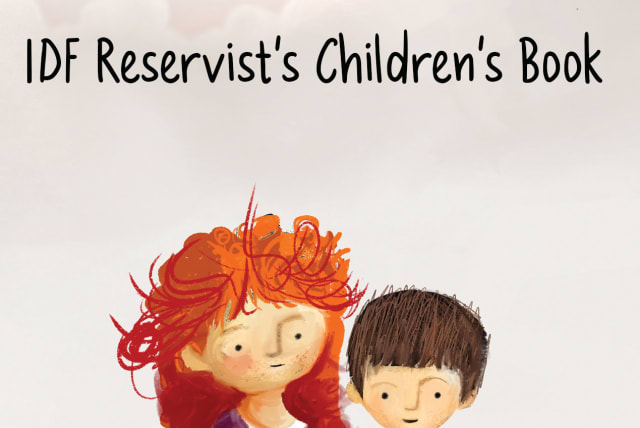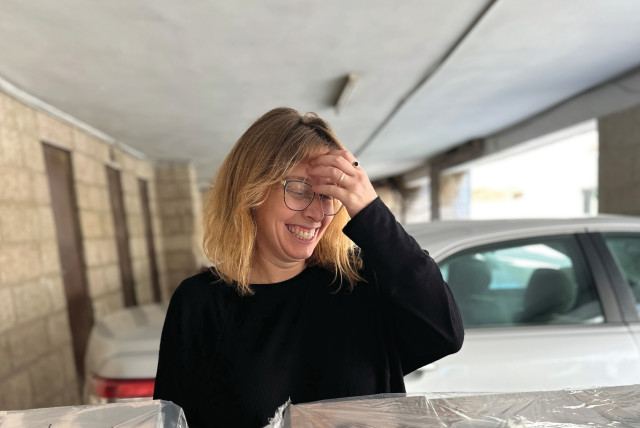Wife of husband in reserves gives hope to those at home during the war

Talya Tomer-Schlesinger found herself alone with three children while her husband was in reserves, so she wrote a book to help children and families talk about their fears.
What would you do if you were alone at home with three young children while your husband was drafted into the army?
Talya Tomer-Schlesinger, a mother of three – ages 7, 5, and 3 – wrote a book, Family in Reserves, which was has been distributed to families like her own.
On the morning of October 7, Tomer-Schlesinger found herself in a shocking situation.
“We woke up early to the news [of the Hamas assault]. No one knew what was going on, so we went down to the shelter to set it up. Then my husband, Yair, got a call from his unit, and he needed to leave immediately. He packed his bag, and I started to clean the shelter and organize it. Later, I realized that I didn’t want to stay home alone with the kids,” she said.
“I was jumpy and nervous. I found myself sticking the older kids in front of a movie while trying to put the little one to sleep in the sling I hadn’t used for a long while.”
Tomer-Schlesinger decided to stay with her cousin. “I thought that with another family who we know and love, it would be easier and that it would feel safer,” she said. However, when she got there, she discovered that it was anything but safe.
“We found out that two cousins of mine who live in Holit (a kibbutz near the border with Gaza) were killed. At first, we knew one of them was killed and thought the other was taken hostage. Then we found out she was murdered too, and her kids, who were almost taken to Gaza, managed to escape with the help of a neighbor. We found ourselves in the middle of this scary situation. My kids learned that mothers of young children could also be killed.”Tomer-Schlesinger realized she had no comforting words to offer her children. “When my son (5) asked if Dad would also be killed, I couldn’t even find the strength to tell him, ‘No way – he is safe.’ I was scared, I was worried, and I was devastated,” she confessed.
She went to a psychologist to look for answers. “The psychologist helped me find words that would build up my children’s psychological strength and bring back some sense of safety. When I came home, my father was outside, playing with my kids. I sat with them on the pavement and drew the map of Israel with chalk. I showed them where Dad was stationed. At that time, he was stationed in the North. I showed them how far it was from Gaza. I told them he had a helmet and a protective vest. I told them about the American aircraft carrier stationed near us and how “strong America” is our friend and will help us win. But it was not enough.”
Tomer-Schlesinger, a graduate of the Bezalel Academy of Art and Design, is an artist who does community projects in the public realm and likes to find answers in books. “I went to our lovely neighborhood bookstore and looked for a children’s book that dealt with the situation. I found children’s books about many issues except for the issue at hand: how to talk with young children about Dad being in reserves during a war, about the fears, about the longing. I had no answers.”
Turning the challenge into creation
She realized that she needed to write her own book and called Daniella Koffler, an illustrator and animator whom she knows – their children are in the same class – and asked if she would be willing to work together on the project. “I told her it must be finished within two weeks and that I have no money now but hope to raise funds later. She is an amazing illustrator, and I knew she was crazy enough to do it. She said yes, and we started.”
“THIS BOOK is the work of a group of mothers,” the author stressed. “The moms who responded told me about situations in their homes; one helped with the rhyming, and another organized the fundraising. I call us ‘Mothers in Reserves,’ as are my parents and other grandparents. We are all in Miluim (the reserves) right now.
“I wrote my children’s words,” she continued. “I wrote about how my children only like the scrambled eggs that Dad prepares on Shabbat, and I found out that it is the same in other families. Many people who read the book said their children thought it was about them.”
When Yair came home for a short visit and then had to go back, her son got very angry. “You are big; you can say you don’t want to go,” he told his father.
“This episode is also in the book. I wrote about missing dad, about being envious of other children whose fathers are home, but I found myself unable to find words that could describe the fear,” Tomer-Schlesinger concedes.
“I sent the drafts to the psychologist too. She said that I had touched on all the important issues except fear and that I had to talk about it because mentioning fear validates their feelings and allows them to express their frightening thoughts. But I could not find a way to address the issue in the book. I mean, how do I talk about this paralyzing fear?”
The answer came to her one evening when Yair was home on a short leave. “He was in the kids’ room reading a story, and at that moment, when all seemed normal again and the kids were with their dad, I thought of using dragons as a way to deal with the fear. Later, I asked my seven-year-old what she thought of the new page, and she said, ‘I do not imagine dragons, but I am afraid that Dad will die. She never expressed that fear before.
“The book opens up the door to such discussions about troubling thoughts that parents don’t even realize their children have. It is so important because the dads are away for so many weeks, and the families are devastated; our whole world was shattered,” she shared. “The mothers carry the entire burden. We need to rebuild a sense of security, but how can we? We are also scared and exhausted, both physically and emotionally. There are also mundane problems that we have to deal with on our own. Thankfully, my father decided to stay with us while my mother is staying with my sister-in-law. He calls it their ‘reserves service.’”
Family in Reserves has already reached almost 10,000 families, from Eilat in the very south up to the Golan, said the author. “It has become a source of comfort and strength for children grappling with the absence of a parent fighting in the IDF during these tumultuous times. One mother wrote, ‘Wow! I just read this book for the first time, and I can’t stop crying. Not only is it very well-written and illustrated, but even the smallest details are spot on...although it makes me sad that a book like this even needs to exist. The reality is that it does. And it is so crucial for our children right now.”
Tomer-Schlesinger’s current plan is to print and distribute another 10,000 books. She is asking for contributions for the printing and distribution of the second edition after the first one went very quickly. “People heard about it and ordered it,” she said. “This morning, I got a call from a father who was home on a short leave and could not find the words to explain to his kids what was happening. He heard about the book and asked me if he could buy one right away, before he needs to go back to Gaza.”
Any plans for the future will have to wait, she said. For now, she just wants to raise enough funds to print another edition and then publish the book in English.
“I am not sure what our world will look like when the war is over, so I don’t know what is next. We will have a lot to rebuild, and we will,” she affirmed.
To donate, go to https://my.israelgives.org/en/fundme/miluimbook...https://my.israelgives.org/en/fundme/miluimbook
Jerusalem Post Store
`; document.getElementById("linkPremium").innerHTML = cont; var divWithLink = document.getElementById("premium-link"); if (divWithLink !== null && divWithLink !== 'undefined') { divWithLink.style.border = "solid 1px #cb0f3e"; divWithLink.style.textAlign = "center"; divWithLink.style.marginBottom = "15px"; divWithLink.style.marginTop = "15px"; divWithLink.style.width = "100%"; divWithLink.style.backgroundColor = "#122952"; divWithLink.style.color = "#ffffff"; divWithLink.style.lineHeight = "1.5"; } } (function (v, i) { });

